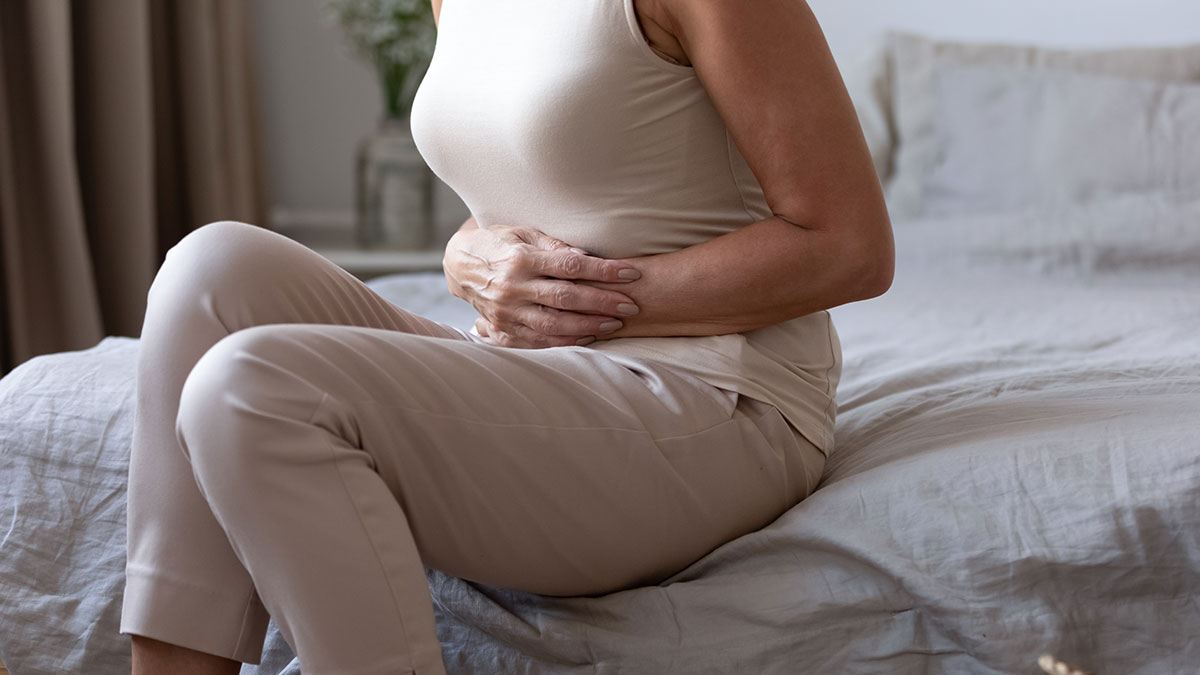How to lose menopause belly is a question we all wish we knew the answer to.
It’s a complicated one, and not finding out the answer makes it even more complicated.
But ladies, there is a solution to menopause weight gain – or multiple solutions if I’m being honest. You just have to have faith in yourself, remind yourself that you can reduce that belly fat, and stay in line with that motivation.
Stomach fat is unavoidable for many women, especially as they age. Yes, that’s unfortunate, but we all have to go through it and we can all go through it together. Stop asking yourself how long does menopause weight gain lasts for!
We can’t stop or restart the estrogen production in our bodies, but we can make moves to help our bodies stay in line – like exercise regularly, limit alcohol consumption, eat the right foods, try to get enough sleep, and take supplements or medications that can help.
Doctors and leading healthcare professionals can tell us it’s near impossible, but it’s not. Pound through those years and get to the root of your specific problems; you’ll shine after that and you’ll feel better about your body for it.
Table of Contents [hide]
Hormonal Shift
During menopause, our hormones go completely out of whack. Frustrating physical changes take place, and it’s not fun to deal with the body imbalances on the daily.
Menopause mainly affects estrogen levels for us, considering that’s the main female hormone roaming our bodies. However, they do have some effect on progesterone and testosterone, too. As some say, menopausal belly fat can be linked to testosterone and progesterone.
High levels of estrogen antagonize symptoms like heavy bleeding, menopause belly bloating, and tenderness in the breasts. Low levels of estrogen antagonize symptoms like headaches, night sweats, hot flashes, fatigue, and insomnia.
Whatever the case may be, high levels or low levels, we’re put in a position we don’t necessarily want to be in: The weight gain position.
Unfortunately, the hormonal shift that naturally happens does involuntarily cause our bodies to gain weight. It could be the extra post menopause bloating going on, it could be the lack of sleep or increase in stress, or it could be a mix of symptoms.
Slowing Metabolic Rate
When the estrogen production in our bodies slows down, our metabolic rate also slows down. It’s a natural effect, and it actually happens before, during, and after menopause.
If our metabolic rate is low, that means our bodies aren’t doing a great job at converting stored energy into working energy. Instead, our bodies are holding onto that energy and storing it as fat, A.K.A. weight gain.
What’s more, is that a decrease in estrogen production can also trigger the body to store important starches and blood sugar less effectively. If this happens, our bodies are likely to store fat more easily, and losing that fat becomes more difficult.
There are potential solutions to speeding up metabolic rate, or at least keeping it steady. Proven results haven’t been found by our leading health care professionals, but many do suggest estrogen hormone therapy to maintain some state of normalcy.
Changing Fat Cell Type
One particular area of menopausal weight gain popped up in my search for answers recently: Changing fat cell type.
According to the two 2015 studies found, bone marrow in a woman’s body is more apt to produce cell-derived fat cells than in a man’s body. That’s not good news for us.
Science just so happens to suggest that estrogen is the main culprit behind this fact because of the fat cells production drastically increasing with age.
The fat cells are more common in a woman’s body plus a woman’s age increases production; that process equals weight gain for us.
As my research on the changing fat cell type went on, I found that the specific bone marrow produced cell, in turn, produces cytokines. What’s worse is that cytokines inhibit insulin sensitivity almost automatically, increasing the risk for Type II diabetes and additional weight gain.
Disrupted Sleep Pattern
As previously mentioned, high and low levels of estrogen generally produce different side effects for us. A disrupted sleep pattern links back to low levels of estrogen – but so is difficulty concentrating, mood changes, fatigue, headache, and weight gain.
But our disrupted sleep patterns don’t just pop out of nowhere. They are triggered due to other common menopause symptoms, like hot flashes, or night sweats.
When our levels of estrogen levels decrease, excessive feelings of warmth can and will happen, day in and day out. It just so happens that they want to overheat our bodies at night more so, while we’re sleeping.
Night sweats can quite literally disrupt our sleep multiple times throughout the night, and turning on the air conditioner when it’s thirty degrees outside isn’t such a smart decision for everyone else in the house.
Unfortunately, the night sweats and disrupted sleep can lead to next day fatigue. And we all know that unhealthy sleeping patterns can lead to stress, and stress can lead to involuntary weight gain.
Decreased Activity Level
Exercise for menopause weight gain is super important for us to take part in. In fact, exercising daily can limit or even omit some of the worst menopausal symptoms.
So, what’s the problem? Probably our motivation levels, and how severely lacking they are.
Going through menopause is a chore, so to speak. The hot flashes, the mood swings, the fatigue, the perimenopause bloating and cramps, the headaches, etc. Everything makes us just want to lounge on the couch, indulge in that new tub of ice cream, and watch our new favorite television show.
Which ultimately means that our decreased activity level only contributes to the weight gain we’re already experiencing. And sure, we’ll wake up one day and say, “Today’s the day! I’ll start my walking routine today!” But, do we?
Nope, and the scale numbers keep going up because we’re not being active and our estrogen levels are provoking weight gain.
Muscle Mass Decline
Once again, estrogen decline can lead to another dreaded symptom: Muscle mass decline.
Generally speaking, estrogen production in women does keep muscle up to par, just like lack of estrogen decreases overall mass. It also decreases bone density, amongst other things in our female bodies.
Unfortunately, not staying active and working out can make the muscle mass decline even worse, especially if we aren’t staying motivated and getting ahead of the decline.
Hormone therapy can, however, help keep the muscle mass in our bodies a little more stabilized than it would be if we didn’t take action against the symptom.
Dietary Changes
There’s nothing we can necessarily do as women to stop the menopause symptoms. But, we can stay away from certain foods to lessen the hot flashes and other similar instances.
Spicy foods are a no-no. They heat up our insides and make us sweat. Sure, they’ll speed up our metabolism, but that’s not our number one concern when we’re going through menopause.
Stay away from caffeine and alcohol, in general. Both substances will also increase hot flashes. But I get it, sometimes a coffee or a glass of wine will get our minds off the lingering menopause. And that’s ok to indulge in those drinks, once in a while, on occasion. Overdoing it will hurt more than help.
On the opposite side of the spectrum, foods that burn belly fat include fruits and vegetables of all sorts. Leafy greens are the best at maintaining our healthy stomachs and staying away from unnecessary belly fat. Certain fruits, like berries and mangos, also have the same effect.
If you have any more dietary change concerns, there are multiple articles and sites to check into.
Increased Alcohol Consumption
As stated above, increased alcohol consumption is not a great idea. Too much beer, wine, and liquor can lead to an increase in hot flashes, bloat, headaches, and much more.
As women going through menopause, we want to limit the unwanted symptoms as much as physically possible.
Having a glass of red wine once in a while is actually good for the heart, cardiovascular system, and overall health of our bodies. Even a beer once in a while or a mixed drink can do us good.
Overindulging is not the route we want to take. Overindulging will lead us to less sleep than we’re already getting and increased bloat. We’re trying to minimize the increase in belly size, not increase it.
Medications will always have some sort of effect on us as women, whether we’re going through menopause or not (but especially if we’re going through menopause).
Some medications can increase the symptoms we’re going through, so talking to your leading healthcare professional about menopause and the medications you’re on is your best bet.
If your condition is worse than normal, minimizing alcohol intake, increasing physical activity, and watching the other areas of your life are what’s in your best interest.
Some hormonal therapies will work wonders, but to each their own. A few have helped me, so I’d say it definitely doesn’t hurt to look into them.
Also, additional menopause belly fat supplements can help reduce belly fat and make us feel better about ourselves.












No Comments Add one
Leave a Comment